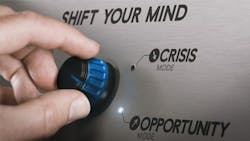How defining moments can make or break your maintenance program
As a continuous improvement manager, I was responsible for the maintenance function at a large manufacturing facility. I had two maintenance managers and close to one hundred personnel for whom I was accountable. And it was far from a leisurely walk in the park when I took the role. Several production lines struggled to meet the numbers, and the pressure to get things going was intense. Or at least I should say that the pressure I put on my performance was intense. I had to succeed and show significant improvements in the performance of the plant assets.
After too many late-night calls due to failed equipment, I knew there had to be a better way and began to search for solutions. Leveraging education and coaching, our team defined the path forward and implemented maintenance and reliability best practices. The team achieved substantial gains in terms of realized capacity improvements, and reduced waste and maintenance costs. It was a defining moment for me.
In writing for the Forbes Coaches Council, Sidney Evans stated, “A defining moment is a point in your life when you’re urged to make a pivotal decision or when you experience something that fundamentally changes you. Not only do these moments define us, but they have a transformative effect on our perceptions and behaviors.” John Maxwell stated, “A defining moment is a challenge or crisis that demonstrates the leadership capacity that lies inside a person.”
For maintenance personnel, defining moments can take many forms. It could be a crisis with a safety or environmental incident, or a catastrophic equipment failure. When a critical event occurs unexpectedly, it can cause significant downtime and financial losses. It forces you to confront the weaknesses in your current practices.
On the positive side, your moment may come like mine, from leading the successful implementation of a significant maintenance and reliability initiative. Whether it's a comprehensive reliability-centered maintenance (RCM3) program, a digital transformation project, or a cross-functional continuous improvement initiative, the success of such endeavors can ignite a passion for driving change and innovation. Leveraging your success, you feel empowered to take on more strategic roles, champion best practices, and become a thought leader within your organization.
I have personally witnessed maintenance professionals and organizations take this approach. In just one of the many examples, a maintenance manager and their team in a wood products plant achieved a 50% cost reduction, went from 78% reactive to 22%, and achieved a schedule attainment from near zero to 78%.
One key to this transformation is to learn from others and then teach others.
You can learn something from everyone. Be a sponge. Seek out knowledge and different concepts. Try to learn something new or take a deeper dive into a subject. Then, actively seek opportunities to share your knowledge and experiences with peers, contribute to industry publications, and participate in conferences and workshops to inspire others.
When you take the time to share your newfound knowledge, insights, and lessons learned with others, it can have a profound impact. The individuals may experience a transformation in their understanding of maintenance and reliability, gain valuable skills, and develop a clearer vision for their path forward. You, in turn, may rediscover your passion for the role, feel a renewed sense of purpose, and become more invested in developing others. This defining moment can foster a culture of continuous learning, knowledge sharing, and succession planning within the organization.
For example, that wood products plant maintenance manager developed ten Certified Maintenance and Reliability Professionals (CMRP) and eighteen Certified Maintenance and Reliability Technicians (CMRT) before moving to a corporate reliability manager role, where he continued to develop others.
Another vital key is a willingness to take risks and embrace adversity. You must be willing to take a leap and take the first step. When management approached that individual to take the maintenance manager role, he knew the current state of the plant. He took the role because he believed he could make a difference. View these moments as opportunities to learn and grow.
Acknowledge fear that comes from uncertainty. It’s a natural human response, especially for those new to the role. When you expect and acknowledge it, you can better overcome its effects so that it does not become paralyzing.
Create an action plan for implementation. Maybe it’s a digital transformation or best practices implementation, but the only way forward is to take the first steps. Having a strategy enables you to share it with others as a communication tool.
Lastly, develop measures that reflect your and your team’s success. You don’t want to do the work and be unable to show improvement. What will be your defining moments?
About the Author
Jeff Shiver
Founder and managing principal at People and Processes, Inc.
Jeff Shiver CMRP is a founder and managing principal at People and Processes, Inc. Jeff guides people to achieve success in maintenance and reliability practices using common sense approaches. Visit his website www.PeopleandProcesses.com, and contact him on LinkedIn at www.linkedin.com/in/jeffshiver or via email at [email protected].

